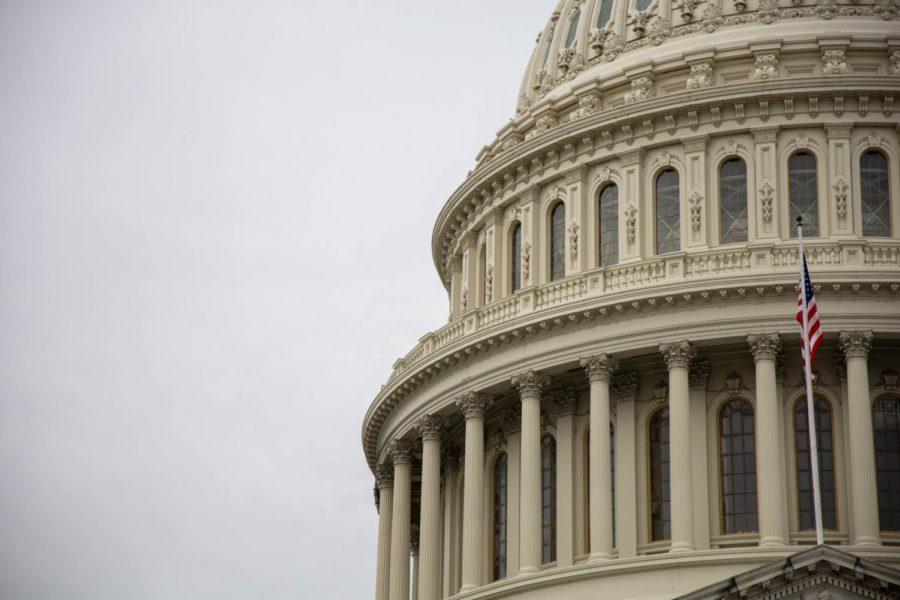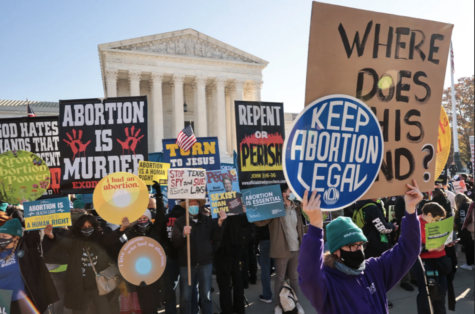A Disgrace to Democracy
The United States Capitol Building Taken By Photographer Joshua Sukoff
In modern America, there is more partisan division than there has been in the past. Republicans and Democrats vote along their side of the aisle in Congress and will not negotiate otherwise. However, there is a stronger cause for this: the Republican Party’s obsession over Donald Trump. Analyzed through the legislation of Republican representatives, here is an explanation of how the Republican Party should now be referred to as the “Party of Trump.”
Now, you may ask, how can a party be centered around a single person? There are three main reasons I believe Trump still holds power and large support over the Republican Party: he has a very persuasive rhetoric that appears to benefit everyone, representatives see him as the most important figure in the party (because of his rhetoric, along with his fame prior to politics), and he uses extreme manners to hold his power, such as the January 6 invasion of the Capitol. How does the Republican Party respond to Trump’s rhetoric and persuasive tactics? By going along with and encouraging it, as shown with the legislation lawmakers write.
A Slow Start Only Skyrockets
The Republican Party is becoming a “Trump Party,” evidently, with the change in legislation Republicans write in the House and Senate. At the beginning of Trump’s term, legislation sponsored by Republicans were largely separate of Trump’s extreme rhetoric. In 2019, however, there was a slight change within Congress. The first noticeable legislation with this change was H.Res.536, or as the lengthy title describes, “Strongly condemning the violent actions of Antifa and recognizing that it engages in domestic terrorism.” The legislation was first introduced in August 2019 by Rep. Mark Green (R-TN-7) after Donald Trump threatened to classify Antifa as a terrorist organization after conservative journalist, Andy Ngo, was beaten and injured by Antifa protestors. Following Trump’s threats towards Antifa, many Republican representatives and senators carried out two main actions to oppose Antifa, such as telling the FBI and Attorney General’s office to classify them as a domestic terrorism organization or introducing legislation to condemn Antifa’s actions. This legislation clearly shows the beginning of Trump’s influence in American politics, which only has skyrocketed since 2019.
Between March 2020 and January 20, 2021, there have been four resolutions that I believe are a result of Trump’s actions and/or influence. The first resolution I found is H.R.6519, offensively named the “Holding the Chinese Communist Party Accountable for Infecting Americans Act of 2020.” The bill, sponsored by Rep. Dan Crenshaw (R-TX-2), was almost clearly written during Spring 2020, at the beginning of the COVID-19 pandemic. Trump made several claims blaming China for the spread of COVID-19 in March 2020. A month later, Representative Crenshaw introduces the previously mentioned bill, which attempts to have Congress blame the spread of COVID on China entirely, along with a few other items relating to the expulsion of journalists covering COVID and censorship of research relating to the virus. Also, the bill attempts to amend Title 28 of the United States Code to allow foreign countries to be sued in United States Courts for damages relating to COVID. Luckily, the bill never went beyond introduction in the House and a referral to the Judiciary committee, but it shows a clear influence Donald Trump had, and still does, on the Republican Party. The bill attempts to have any country be sued in American courts, but clearly targets China in full blame for actions relating to COVID. This also clearly exemplifies something most Republicans attempt to do: avoid blaming Trump for the large (and irresponsible) spread of COVID. But the party must face it at point-blank: Trump is the main reason why we are still going through this pandemic. He could have taken better measures to prevent spread but instead, decided to promote himself over the safety of the people.
Republicans in the House have also attempted to condemn the social media platform, Twitter, through a House resolution. The resolution, introduced by Rep. Doug Lamborn (R-CO-5), claims Twitter violates its “civic integrity policy” by censoring, or simply fact-checking, Trump’s tweets about mail-in ballots in the November 2020 election. According to the policy, it would protect against misinformation against “civic processes,” such as elections, censuses, and voting. Twitter stated Trump violated this policy by providing misleading information in regard to mail-in ballots. The legislation says Twitter is partisan, as mentioned previously, but the simple fact is that Twitter is only following their own policies. Just because Trump got flagged for misinformation does not mean everything Twitter does is across party lines.
But this legislation proves something larger: how far the Republican Party is willing to go to have Trump stay in office. The Party, along with Trump, knows mail-in ballots could be the pushing factor to stop him from staying in office. With Trump claiming mail-in ballots lead to fraud, his supporters in elected offices around the country will draft legislation to place strict restrictions or even a complete ban on mail-in ballots, which prevents more liberal voters to vote for candidates of their choice, especially during the pandemic. With a large social media platform like Twitter labelling his claims as misinformation, his supporters in the U.S. House will support legislation that can aid Trump’s efforts to stay in office.
These attempts did not prove successful for the Republican Party; Joe Biden won the election, much to the dismay of conservatives. Republican Congressman Ken Buck (R-CO-4) decided to respond by pushing forward Trump’s claims of voter fraud and introduce legislation about it. H.Res.1256, introduced in early December 2020, claims there were some “legal” votes were not counted in the election that November, and attempts to initiate an investigation into the alleged fraud. However, the fact that there was enough voter fraud to change the result of an election is very unlikely. A study from the Associated Press (AP) cites there were 475 potential cases of voter fraud in 6 key states, but none of those could affect the outcome of the election. Election fraud in general is very rare, as there is a less than 0.01 percent chance of election fraud happening. The fact that Ken Buck, along with his 33 cosponsors (all Republicans), believe this something our country should worry about, is quite concerning that the Republicans will go to any lengths to keep a president who will do anything to win.
The Influence (Should Have) Waned
After Trump left presidential office on January 20, 2021, some of the American public, including myself, thought there would be a breath of fresh air. Unfortunately, I was very, very wrong. Within hours of Biden being sworn in as president, Rep. Marjorie Taylor Greene (R-GA-14) introduced legislation trying to impeach Biden for “abusing his power” while he was vice president. This attempt was largely unnecessary for two reasons. For one, impeaching a president should mostly be introduced for reasons relating to their current presidency, and Biden was in office for less than a day when H.Res.57 was introduced, making it unlikely to give Rep. Greene reason to impeach. Second, Biden’s actions that are reason for impeachment (threatening to retain funds to Ukraine while the Ukrainian government was investigating a company Biden’s son Hunter was on the board of) have been backed by other government agencies—not just Biden, spreading Rep. Greene’s explanation of introduction of this legislation very thin.
So, why would Rep. Greene do all of this for no reason? Well, Rep. Greene is a large supporter of Donald Trump, even going as far to express belief in the conspiracy theory, Q-Anon. Because of her large support for Trump, Rep. Greene seeks validation from Trump himself. With her initiation of an impeachment resolution for Biden, she believes Trump will approve of her actions and support. Also, since she thinks the 2020 election is “stolen” or “fraudulent,” she holds the belief that Trump will be put back in office if it works out for the resolution.
Since Trump has left office, there has also been attempts to reinstate legislation he pushed for. The first example is the REMAIN in Mexico Act from Rep. Matthew Rosendale Sr. (R-MT) introduced in February 2021. The bill, which attempts to reimplement a Trump policy that requires asylum seekers to stay in Mexico while waiting for the processing of their cases. The policy had been repealed on the first day Biden entered office. Rep. Rosendale’s efforts to reinstate this policy is a reflection of how much the Republican party misses Trump being in the Oval Office, despite this policy openly stereotyping all asylum seekers to be from Mexico, which proves a different point about the GOP. The party wants his influence in government and introduces policies to feel confident there is Trump’s power in American democracy.
Another Trump-era policy Republicans try to reinstate through legislation is H.R.514, nicknamed the “Preserve American History Act.” This bill requires some context to be understood. In August 2019, The New York Times published a collection of essays, pictures, and advocated for a history curriculum based more around Black stories, beginning in 1619–the start of the long history of slavery. Over a year later, the day before the 2020 election, Trump issued an executive order for a “1776 Commission.” The commission would recommend how American history should be taught in schools because Trump believed modern-day society “vilified our Founders and founding” and “[are teaching] students…in school to hate their own country,” summing up his claims as “radicalizing.” While not directly stated in the executive order, Trump is aiming to have a white-centered view on American history presented in schools, as shown through his attempts to counter the 1619 Project.
Now, onto the bill. After Joe Biden entered office, he put an end to the commission through executive order. Conservatives in support of the commission reacted poorly to Biden’s action, so Rep. Ted Budd (R-NC-13) introduced H.R.514 in response. The bill, which gained 22 Republican cosponsors, tries to make Trump’s 1776 commission into law. These efforts have not gone anywhere in the fourteen months since the introduction of this bill, which proves good for activists and our education system.
But this all gives a larger scope into what conservatives want to have: their every move be inspired by Trump. Rep. Budd wanted to reinstate Trump’s inherently racist policies with legislation and gained 22 cosponsors from it. Currently, that is more than 10% of the Republican caucus in the House. May I add that there are probably more that would like to cosponsor a Trump-influenced bill but worry of a poor image afterwards?
The “You Must Be Alive to Vote Act of 2021” is the last example of Trump’s influence over Republican legislators. The bill works to amend the National Voter Registration Act of 1993 and Social Security Act to enact a law that requires annual removal of voters who have died within the last year. While this may seem like an ordinary bill regarding voting laws, there is something more Trump-influenced to it. Prior to the 2020 election, Trump and his supporters claimed dead people were voting for Biden. These claims turn out to be false, as in the rare instance of a “dead person” voting, the vote was for Trump. The attempts by Republicans to enact stricter voting laws, which this bill can fall under, is all part of a suppression of voters and a moment to make sure they win in future elections. Trump wanted to win, but he didn’t, so he uses his supporters to hold strong beliefs that he was robbed of winning the election, which leads to this bill being introduced.
The GOP is not the “Grand Old Party” anymore. America cannot stand with a party that supposedly stands for the people but is influenced by one person whose only control is lying, being offensive, and inciting violent attacks in order to promote his agenda. Trump’s actions will not end well for democracy, as he is causing a larger partisan divide than there ever has been in American history. If the Republican Party decides to still show support for Trump, they are only igniting the fire that will soon burn down democracy.
Your donation will support the student journalists of Mounds Park Academy. Your contribution will allow us to purchase equipment and cover our annual website hosting costs.












